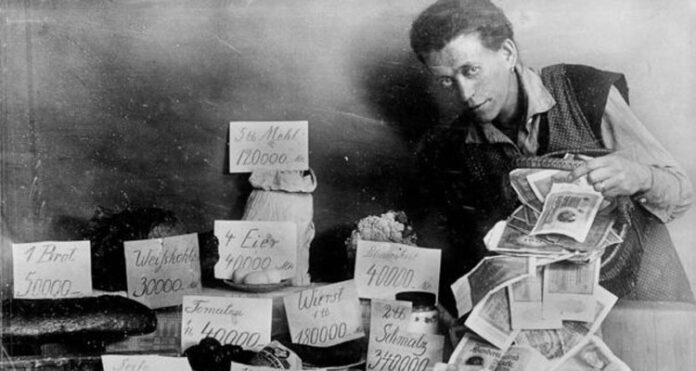Hyperinflation of the German papiermark currency between 1921 and 1924 caused widespread financial distress, and significantly challenged the authority of the country’s postwar Weimar Republic, which was struggling to rebuild the country after the devastations of World War I. Many historians attribute the hyperinflation to the onerous reparations payments demanded of Germany by the Treaty of Versailles.
The Episcopal Church of the Ascension, also known as the American Church in Munich, was founded in 1903 to serve the city’s American population, and its mission house in the Salvatorplatz, at the heart of the old city, included a large library of English-language books. In 1942, the church was closed by the Gestapo, which destroyed its contents; but it reconvened after World War II, and continues as a parish of the Episcopal Convocation in Europe, sharing space with the Lutheran Emmauskirche in Harlaching, a residential suburb. This article was published in the March 29, 1924, issue of The Living Church.
The Work of the Church in Munich
By the Ven. W.E. Nies, rector of the American Church in Munich
No doubt many people at home wonder why, with so few Americans remaining in the German cities, and with conditions so upset and difficult, we continue our Church work — for our spiritual ministrations are for Americans and not for the people of the country. The answer is simple. It was the policy of the late dear Bishop Mott Williams [the Episcopal Church’s first Suffragan Bishop in Charge of Europe, 1916-23] to open his churches in Germany after the peace, and keep them open if it could be done. Possibly he thought at the time that, the war being over, conditions would soon become settled, and Americans come back again to the two great art and music centers where we have our churches. … The bishop was, above all, a man of wide outlook and the sincerest Christian feeling. He saw the opportunity for a ministry of reconciliation and help in the land of a fallen foe and was not slow in guiding his policy accordingly.
So, while not without its difficulties, the Church work is here and is going on, and my part of it is centered in Munich.
It is a mistake to suppose that the work is confined to relief work among the Germans. In 1922 there was a confirmation class of seventeen — equal in size to that at the American Church in Paris. Of this class sixteen were born in America or in England, and one in Munich of an American mother. In 1923, besides visitors whose stays were of longer or shorter duration, enough art and music students braved the difficulties of residence here to make about forty regularly using the library connected with our work. They found a welcome, plenty of company and good books, magazines, and newspapers, and bought their tea and toast there. They were not rich, so their contributions to the Church’s work were not very material, but the library was a home to them, and many came to the services and helped in the choir. The recent summersault in the exchange rate which made this the dearest country in Europe, has lost us four-fifths of them to Italy, but we did what we could for them while they were here. The same cause has driven about four-fifths of all other Americans and English away, but price conditions may get better and other people may take their place. There is always a certain number of permanent American residents here, but their number is very small compared to the number in peace times.
While all put together would not make much of a congregation, the odd fact is that we have the church quite full every Sunday; at times needing to bring in extra chairs. The visitors are Germans, who speak and understand English. The local churches have finished their services before ours begin. With rare exceptions, the visitors are not of the class that need or want assistance, but, since our charitable efforts for German children became generally known, many people became interested in us and wanted to see what we were like. They seem to keep coming and we don’t hinder them. They like the liturgical service and join in the singing. The most of them tell me that they expect, at some time, to get to America. One of the most indefatigable for our Sunday visitors is Herman Gassner, whose fine Shakespearean translations into German are those universally used for stage productions in Germany where Shakespeare (strange country!) still gets as good a house as the movies.
And now about our relief work. In early December, when I wrote of the phenomenon of children of respectable families going from door to door begging for bread, the State’s experiment of making a new gold mark currency had just been gotten under way. The paper marks had fallen to the point where it took eighty billions of them to mail a letter to the United States. The cure applied was to increase nearly fourfold the postage, and to call it thirty pfennig (gold standard). There is the figure 30 on the stamps now, but it means, in paper marks, 300 billions. I select the postage stamp as a measuring standard so it can be seen what has happened to prices. Food, clothing, shoes, everything, went up to this artificially created gold standard price. And it did not stop there. Prices, for some reason or other, soared far beyond world prices. In the last two weeks, however, there has been a betterment in this respect. Prices of most foods are now about at the world standard.
The first and natural effect of the sudden high prices has been to put a disastrous damper on business. The result is that factories, offices, and banks have discharged, or are in process of discharging, one fifth or one fourth of their employees. Added to this, the city and state departments are cutting down their staffs in the same proportion as well as the salaries of those remaining. Even the universities are affected. This is in accordance with the State’s plan to help stabilize the gold mark by cutting off expenses.
This is the situation at present. We can readily see its effect on an already impoverished middle class and the suffering entailed on children. Never, during or since the war, was there so much hardship as at the present time. The latest statistics of children’s physical degeneration and mortality are as bad as at any time during the war, and the future looks gloomier than ever, with so many thrown out of work. As I talk to the people I find that what seems to oppress them most is the long time that this hardship has been going on. They are on the borders of despair. Others, in other parts of the world, have, of course, gone, or are going through as great sufferings, but they are not so long drawn out.
About ten days ago I received a desperate letter from someone who signed under his name “piano virtuoso.” I wrote him to come to my house to see me. He was true to type, with an emotional face and long hair. He had five children, and could not get enough engagements or pupils to enable him to buy them food. I asked him to play me something at the piano. I have heard fine players and he, even with his cold fingers, was among the best. I gave him food for his children for two weeks, and encouragement. It seems little but it gave him new heart. His case is that of very many of the fine musicians in Germany. Their cases bear close investigation.
Some time ago our attention was called to the case of a widow, an educated woman, whose husband had fallen in the war. She, with her sixteen-year-old son, was in distress for food. The boy was sick. I did not inquire closely as to details but helped at the time. The boy had soon to be taken to the hospital for an operation. He had to undergo two. At the first his leg was amputated — at the knee, and at a second at the thigh. He was this week brought home to his distressed mother. The surgeon said that a tubercular condition of the bone had developed which required the operation to save the boy’s life. The condition was brought on by undernourishment. Cases of this kind, of more or less severity, are common at the clinics, especially among children: this, and rickets.
On the day before Christmas a poor widow of a good class was asked to come to the American library to receive a consignment of food. She came with a child of about four and a half years. She had two more at home and was in great poverty, and the children without food and clothing: the child with her showed it. She was a very quiet little thing with pinched face and wondering eyes. Her clothes were very thin and old, but carefully mended and clean. Her shabby shoes were neatly blacked and stitched together with black thread. She seemed half frozen. A box of children’s clothing having just arrived from the American Welfare Association, of Chicago, the child was furnished with warm underwear, stockings, and shoes, and a comfortable little sweater. While the mother was receiving them the child looked on in silence. Then there came out of the box a small rag doll. It was a funny looking affair, but it was handed to the child. She took it with an unforgettable gurgle in the throat that expressed her joy and delight, and held it close while her eyes danced. One could see that she regarded it as the most wonderful and beautiful object she had ever seen or known. She had never had a doll before. It has been many a Christmas since food did not come first with poor widows with children. We explained to the child that the doll was for her but she couldn’t understand it, and supposed it was given her only to hold for a while; so she held it tight. At last the mother made her understand that it was really her own to keep and the child’s face was a study in the spirit of Christmas.
Just now appeals are beginning to come in from many of the people with families to support, who have been thrown out of employment in the dead of winter. What can we do to help them? Just as much as merciful people who are not cold and hungry at home find it in their hearts to enable me to do in the name of our Lord and His Church. On December 24th, we distributed over 300 packages of food for children — flour, rice, cocoa, sugar, lard, milk, etc. — and three boxes of clothing, and on January 15th, 100 more packages and a large packing case of clothes and shoes. We mean to go on so long as conditions are nearly as bad as at present and people at home will help us.
Munich, January 27




